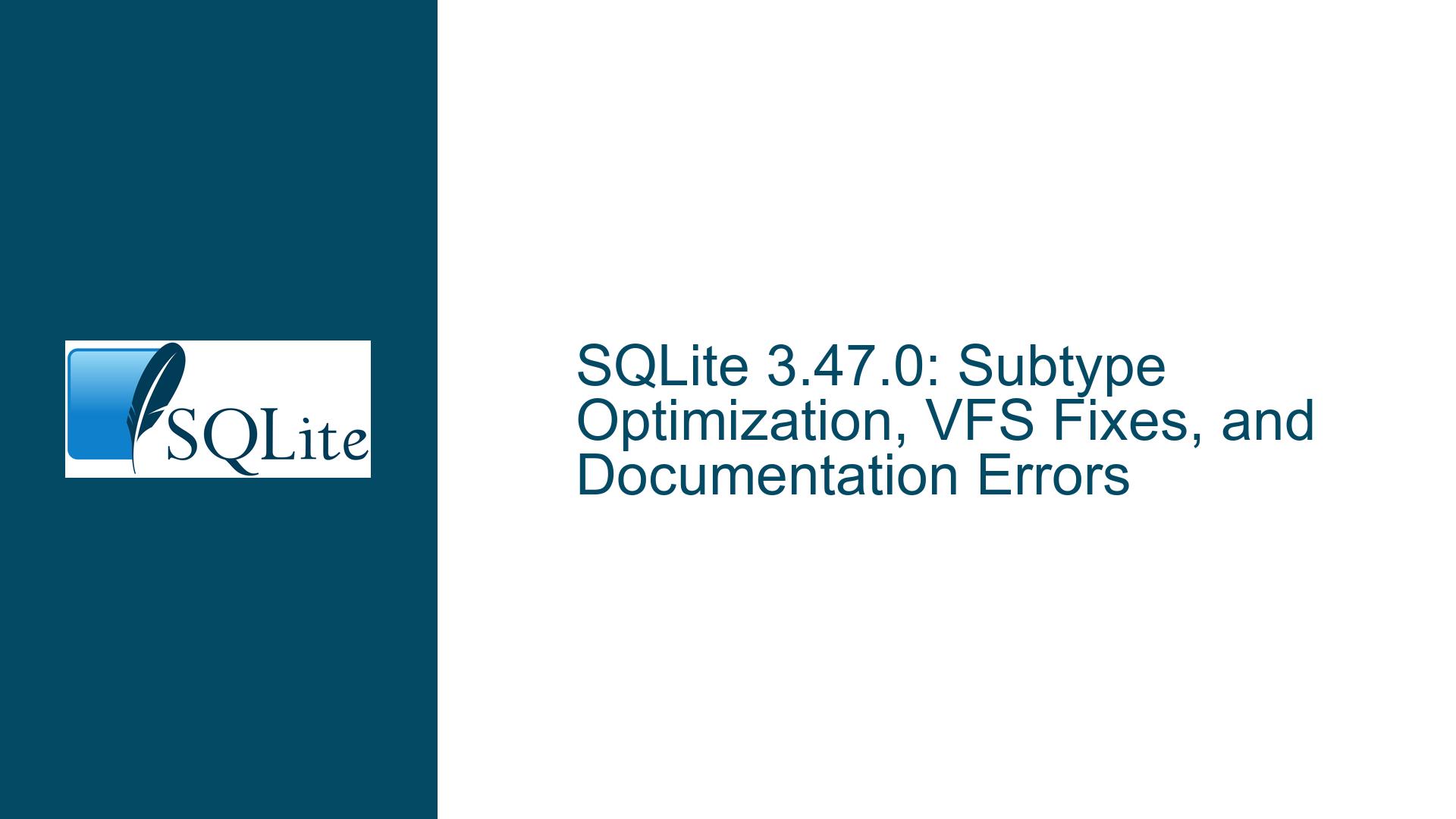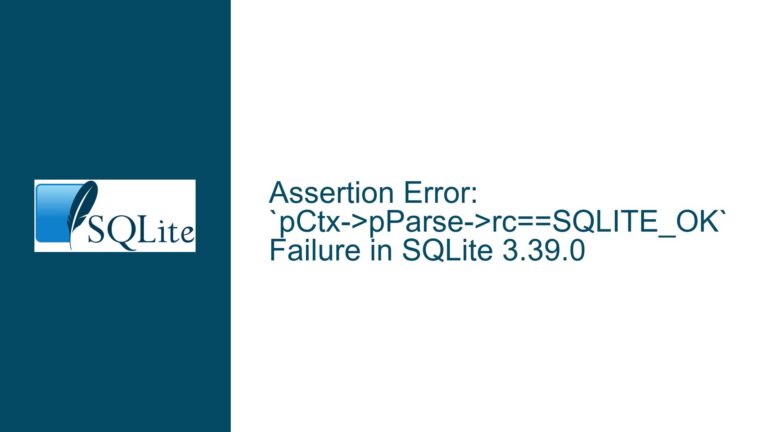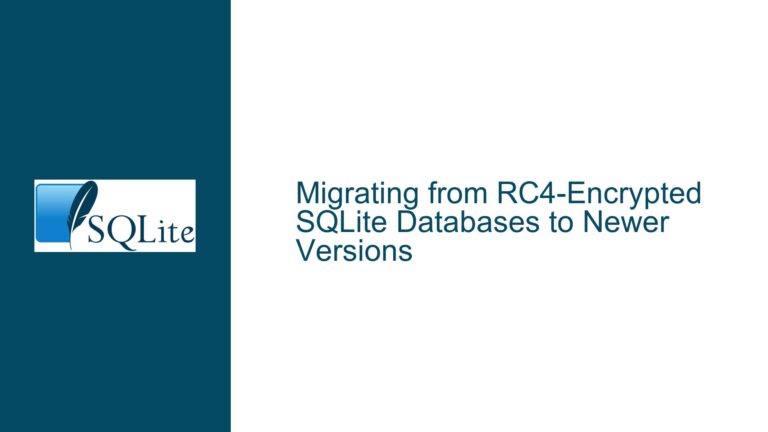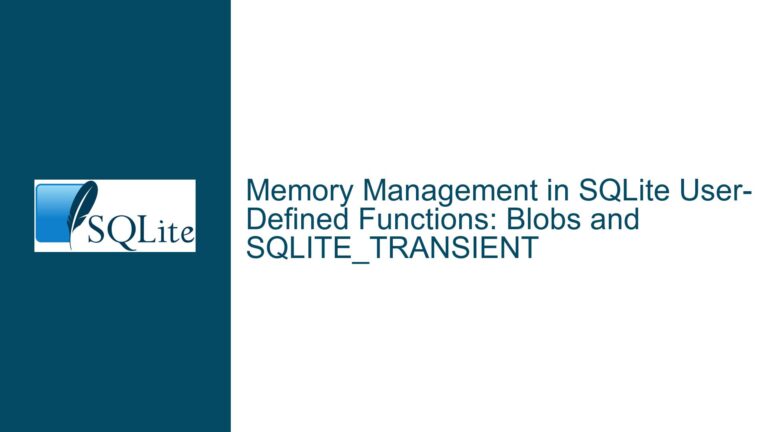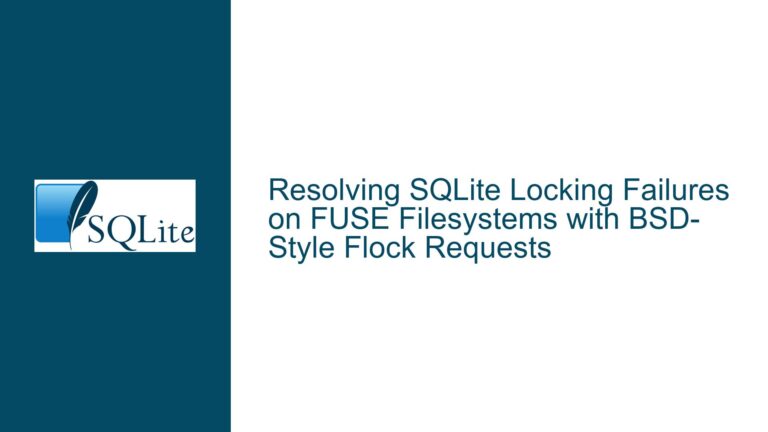SQLite 3.47.0: Subtype Optimization, VFS Fixes, and Documentation Errors
Subtype Optimization in Index Expressions and Its Performance Implications
The core issue revolves around the optimization of subtype expressions in SQLite 3.47.0, particularly how they interact with index usage and query performance. Subtypes are a feature in SQLite that allow functions to return values with additional metadata, which can be useful for extensions like JSON functions. However, this metadata is not stored in indexes, leading to potential performance bottlenecks.
Prior to SQLite 3.45.0, using subtype functions in index expressions could result in the query planner avoiding the use of those indexes entirely. This was because the subtype metadata could not be stored in the index, forcing the query planner to recompute the function at runtime. This recomputation negated the performance benefits of using an index, as the query planner could not guarantee that the subtype would remain consistent with the indexed value.
In SQLite 3.47.0, a new optimization (referred to as "Optimization 8g") has been introduced to address this limitation. This optimization allows the query planner to use the indexed value of a subtype function, provided that the subtype is not used as an argument to another function that might read the subtype. This means that if the subtype metadata is not required for further computation, the indexed value can be used directly, avoiding the need for runtime recomputation.
However, this optimization is not a silver bullet. If the subtype is required for further computation, the query planner will still need to recompute the function, leading to potential performance degradation. This is particularly relevant for developers who use custom SQLite extensions that rely heavily on subtype functions. In such cases, it is crucial to understand whether the subtype metadata is necessary for the query’s logic. If it is not, the optimization can provide significant performance benefits. If it is, developers may need to reconsider their indexing strategy or explore alternative approaches to avoid the performance hit.
Hot Journal Rollback Issues in Unix-Dotfile and Flock VFS
Another critical issue discussed in the forum thread pertains to the handling of hot journal files in the Unix-Dotfile and Flock VFS (Virtual File System) implementations. A hot journal file is a temporary file used by SQLite during transactions to ensure atomicity and durability. If a transaction is interrupted (e.g., due to a crash), the hot journal file allows SQLite to roll back the transaction and restore the database to a consistent state.
In the Unix-Dotfile VFS, a bug was identified where rolling back hot journal files could fail under certain conditions. This issue was reported and subsequently fixed in SQLite 3.47.0. However, a similar issue was also reported for the Flock VFS, but it remains unclear whether this issue was addressed in the latest release. The Flock VFS is a less commonly used implementation, and it is possible that the bug was either overlooked or intentionally deferred due to its low usage.
The implications of this issue are significant for users who rely on the Flock VFS. If the bug persists, it could lead to data corruption or loss in the event of a transaction rollback. Users of the Flock VFS should be cautious and consider testing their systems thoroughly to ensure that hot journal rollbacks are functioning correctly. If the issue is confirmed, it may be necessary to switch to a different VFS implementation or apply a custom patch until an official fix is released.
Documentation Errors and API Enhancements in SQLite 3.47.0
The final issue highlighted in the discussion involves documentation errors and potential enhancements to the SQLite API. Specifically, there are discrepancies in the documentation for the RAISE function, which incorrectly states that the feature was introduced in 2021 instead of 2024. This error is likely due to a copy-paste mistake from an earlier version of the documentation. While this is a minor issue, it could cause confusion for developers who rely on the documentation for accurate information.
In addition to documentation errors, there is a discussion about potential enhancements to the SQLite API, particularly regarding the retrieval of column metadata. Currently, the sqlite3_column_origin_name function returns the original column name or alias, but it does not provide information about table aliases used in queries. This limitation can make it difficult for developers to fully understand the structure of complex queries, especially when table aliases are involved.
A proposed enhancement would introduce a new function that returns the table alias if present, or the table name otherwise. This would provide greater flexibility and clarity when working with prepared statements and complex queries. However, implementing this change would require careful consideration to avoid breaking existing code that relies on the current behavior. Developers who need this functionality can use workarounds, such as parsing the SQL query manually, but a native solution would be more efficient and reliable.
Troubleshooting Steps, Solutions, and Fixes
To address the issues discussed above, developers can take the following steps:
Subtype Optimization: If you are using subtype functions in index expressions, evaluate whether the subtype metadata is necessary for your queries. If it is not, ensure that your SQLite version is 3.47.0 or later to take advantage of the new optimization. If the subtype is required, consider alternative approaches, such as precomputing the values or using a different indexing strategy.
Hot Journal Rollback: If you are using the Unix-Dotfile VFS, verify that your SQLite installation is updated to version 3.47.0 to benefit from the bug fix. For users of the Flock VFS, test your system to confirm whether the hot journal rollback issue persists. If it does, consider switching to a different VFS implementation or applying a custom patch until an official fix is available.
Documentation and API Enhancements: If you encounter discrepancies in the SQLite documentation, report them to the SQLite team to ensure they are corrected in future releases. For the proposed API enhancement regarding table aliases, monitor the SQLite development timeline for updates. In the meantime, use workarounds such as manual query parsing to retrieve the necessary metadata.
By following these steps, developers can mitigate the impact of these issues and ensure that their SQLite-based applications remain robust and efficient.
